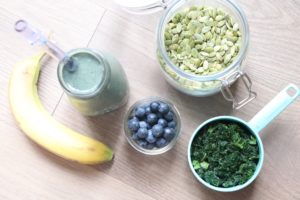Antioxidants are just that: they fight (anti) oxidation.
The chemical process of oxidation is like rusting metal. A molecule loses electrons and creates the infamous free radicals. Oxidation is also the reason why apples, bananas, and avocados go brown when the skin is broken, and they’re exposed to air – they’re getting oxidized.
Free radicals in the body cause inflammation and can contribute to diseases like cancers, diabetes, and heart disease (to name a few). And it’s not just in the body, we can have inflammation of the brain too causing a decline in cognitive function contributing to feelings of ANXIETY!
So, the antidote to oxidation is the antioxidant. Vitamins like vitamins A, C, and E are examples of antioxidants and they are neuro-protective. So are other compounds in foods like carotenoids and phenols. These compounds sacrifice their electrons to stop the oxidation process; this is why squirting some lemon juice on your sliced apples, bananas and avocados slows down the browning process.
But don’t think that all oxidation in the body is bad. It’s not. Your body naturally oxidizes compounds all the time when it’s doing healthy things like metabolizing nutrients or exercising.
As with many things in life and health, the key is maintaining a good balance. In this case, as the balance between oxidation and antioxidation.
We can throw off that balance with exposure to too much alcohol, smoking, or environmental pollutants. Even over-exercising or too much sun exposure can create too much oxidation.
The best sources of antioxidants to combat this effect are nutritious whole foods, like colourful fresh produce, e.g., blueberries, green kale, purple cabbage, etc. In fact, the more colourful and darker the plant is, the higher levels of antioxidants it usually has. Chemicals that give the plants their deep colours are often the antioxidants themselves.
ANTIOXIDANTS IN FOOD
Let me list out a bunch of antioxidants and the foods they’re found in:
- Vitamin A – Found in liver, dark leafy greens (e.g., kale), orange fruits and veggies (e.g., mangoes, carrots & squashes)
- Vitamin C – Found in bell peppers, citrus, berries, and leafy greens
- Vitamin E – Found in leafy greens, nuts (e.g., walnuts), and seeds (e.g., sunflowers)
- Carotenoids (e.g., beta-carotene, lycopene, etc.) – Found in tomatoes, carrots, squash, sweet potatoes, and salmon
- Phenols – Found in green tea, black tea, coffee, cocoa, red wine, and berries
Blueberries are probably one of the most studied antioxidant foods. They contain a range of phytochemical (i.e., plant chemical) compounds and are very high in anthocyanins (the blue-coloured compound).
The antioxidant capacity can be measured in a laboratory; this is called the “oxygen radical absorption capacity,” or “ORAC.” And blueberries have one of the highest ORAC levels.
FUN FACT: Some studies estimate that the highest source of antioxidants in the average American is not from berries, it’s from coffee! Can you imagine how much healthier people can be if they added a few more servings of antioxidant-rich fruits and vegetables to their days?
CONCLUSION
There are antioxidant vitamins (A, C & E) and other antioxidants like carotenoids and polyphenols in food. They’re highest in colourful fruits and vegetables, nuts and seeds, some meats, tea, coffee, and cocoa.
Which antioxidant-rich foods and drinks are your favourites? Let me know in the comments below.
Recipe (Antioxidant-rich): Blueberry Smoothie
Serves 2

INGREDIENTS
1 handful kale leaves, fresh or 1 cup frozen
1 cup blueberries, fresh or frozen
1 banana
1 cup unsweetened coconut milk
2 tbsp Pumpkin Seeds
*Optional: high quality vegan vanilla protein powder
INSTRUCTIONS
Place all ingredients in a blender. Blend until smooth.
Serve & enjoy!
Tip: Use any greens you have on hand in place of the kale, if you wish.
References:
https://www.precisionnutrition.com/encyclopedia/food/antioxidants
https://www.precisionnutrition.com/soreness-and-blueberries
https://www.precisionnutrition.com/all-about-coffee
https://examine.com/nutrition/4-science-based-superfoods-you-should-be-eating/


